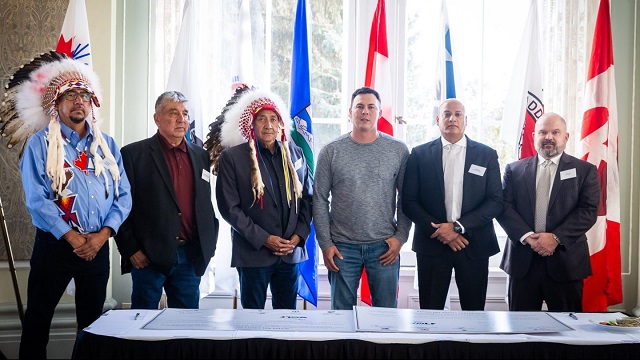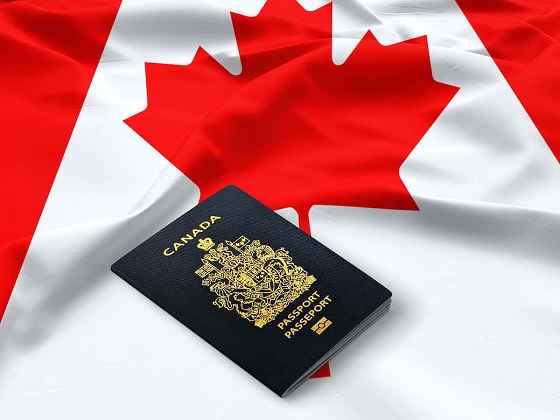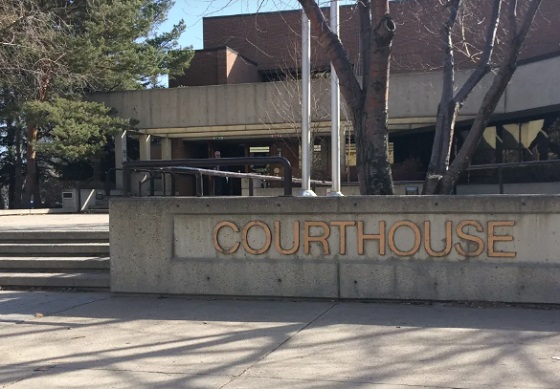Alberta
Indigenous leaders see progress in 2023 but continue to advocate for national loan guarantee program

Wolf Midstream and its partners in the Northern Lakeland Indigenous Alliance participate in a signing ceremony celebrating a $103 million loan guarantee from the AIOC to obtain a 43% stake in the Access NGL Pipeline System. Photo courtesy AIOC
From the Canadian Energy Centre
By Shawn Logan
“Things are starting to work but self-determination is the ultimate goal.”
When John Desjarlais reflects on 2023, he admits he had feared a growing national tide of Indigenous investment in key energy projects was due to hit a speedbump.
Instead, as a new year approaches, the executive director of the Indigenous Resource Network (IRN) says any doubts have been replaced by optimism that the positive momentum of the last few years will flow into 2024.
“I’m feeling more optimistic now. I’m pleased to see the level of conversation being had with Indigenous leaders,” he said.
“I think there is growing opportunity for Indigenous participation across entire value chains, for board and executive positions, and more meaningful involvement. I think we’re really going to see the needle move in 2024.”
 John Desjarlais, executive director of the Indigenous Resource Network in Bragg Creek, Alta. Photo by Dave Chidley for the Canadian Energy Centre
John Desjarlais, executive director of the Indigenous Resource Network in Bragg Creek, Alta. Photo by Dave Chidley for the Canadian Energy Centre
Despite the year’s slow start, Desjarlais said 2023 became something of a bellwether for how the rest of the world views the involvement of First Nations and Métis in Canada’s oil and gas industry.
In April, Desjarlais joined a delegation of Indigenous leaders in Ottawa to meet face-to-face with diplomats from some of the world’s strongest economies. Joined by Haisla Nation Chief Councillor Crystal Smith, First Nations LNG Alliance CEO Karen Ogen and former Enoch Cree First Nation chief Billy Morin, the delegation quickly learned not only was there an appetite for Canadian energy, but for Indigenous knowledge and participation on the critical file.
“Every official had a real desire to really understand Indigenous sentiment around resource development. There was a sincere desire to learn from our perspective,” Desjarlais told the CEC following the meetings with representatives from G7 allies Germany, France, Japan and the United States, as well as Poland and India.
However, while potential international energy partners are intrigued by the potential of relationships with Indigenous energy suppliers, a significant hurdle remains – the need for a national loan guarantee program that would empower more Indigenous ownership in community-transforming projects, particularly oil and gas.
Dale Swampy, president of the National Coalition of Chiefs, is a veteran in the fight for First Nations and Métis to fully benefit from critical resources to directly benefit communities. And he is hopeful there is growing recognition in Ottawa that enabling self-determination is an effective and enduring pathway to prosperity.
“The only way to defeat on-reserve poverty is to create ways to employ people,” he said.
“And the only industry that gives us this opportunity is the natural resources industry.”
Alberta has been a leader in helping open doors to indigenous ownership of major resource projects, launching the Alberta Indigenous Opportunities Corporation (AIOC) in 2019. As the year came to a close, the AIOC announced two more major deals, which will see the total investment backed by the fund to date reach more than $680 million, directly impacting 42 Indigenous groups.
 Dale Swampy President National Coalition of Chiefs. Canadian Energy Centre photo
Dale Swampy President National Coalition of Chiefs. Canadian Energy Centre photo
In what marks the second-largest loan guarantee backed by the provincial corporation, 12 Indigenous communities will invest $150 million to obtain 85 per cent ownership in oil and gas midstream infrastructure in the Marten Hills and Nipisi areas of the Clearwater play in Northern Alberta.
While the ink was still drying, two days later another deal saw five First Nations in northwestern Alberta enter into a $20.5 million partnership with NuVista Energy Ltd. for majority ownership of an emissions-reducing cogeneration unit at the Wembley gas plant in the County of Grande Prairie.
The AIOC’s success saw the Alberta government increase its loan guarantee capacity to $2 billion this year, and it’s set to increase it further to $3 billion for the 2024-2025 fiscal year.
Desjarlais’ IRN spent most of 2023 advocating for a federal version of the AIOC, to emulate its success at the national level.
 Chief Greg Desjarlais of Frog Lake First Nation signs a historic agreement between Enbridge and 23 First Nation and Métis communities in September 2022. The communities acquired, collectively, an 11.57% non-operating interest in seven Enbridge-operated pipelines in the Athabasca region of northern Alberta for $1.12 billion on September 22, 2022. Photo courtesy Enbridge
Chief Greg Desjarlais of Frog Lake First Nation signs a historic agreement between Enbridge and 23 First Nation and Métis communities in September 2022. The communities acquired, collectively, an 11.57% non-operating interest in seven Enbridge-operated pipelines in the Athabasca region of northern Alberta for $1.12 billion on September 22, 2022. Photo courtesy Enbridge
In its fall financial update, the federal government announced it would unveil a new Indigenous loan guarantee program when it sets its 2024 budget this spring. But there has been no commitment to include oil and gas projects as part of the program.
Desjarlais said the fact a program has been promised is a good first step – now Indigenous leaders need to convince the federal government that imposing restrictions will only impede economic reconciliation.
“It looks like there is a program coming but we have to take a look at the exclusions,” he said.
“What we really want to see is less paternalism. Things are starting to work but self-determination is the ultimate goal.”
Desjarlais said the last few years have seen significant progress when it comes to Indigenous involvement in resource projects.
On the west coast, Indigenous-owned Cedar LNG and Ksi Lisims LNG will be at the vanguard of Canada’s first significant foray into exporting the in-demand fuel for customers in Asia. While several Indigenous communities across western Canada are investing in critical infrastructure like pipelines and carbon capture and storage projects.
For Swampy, that progress is long overdue. And it’s becoming increasingly clear that Indigenous communities no longer want to be reliant on government supports – they want to take control of their own destinies.
“They want to take part in the prosperity that comes with oil and gas, and they want to own it,” he said.
“All we ask is that we be involved when it comes to the question about land and resources. We don’t want to just be part of these consultations, we want to lead projects.”
Alberta
Canada’s postal service refuses to help with Trudeau’s gun ban buyback program: report

From LifeSiteNews
According to a report, Canada’s mail service notified the Trudeau government via a letter that it would not participate in the buyback scheme, citing safety concerns for its employees.
Canadian Prime Minister Justin Trudeau’s federal government crackdown on legal gun owners through a buyback scheme has hit a major roadblock after Canada Post, a federal-run institution, signaled it will refuse to participate in scooping up thousands of legally purchased firearms at the bequest of the government.
According to government sources in a recent Radio-Canada report, the Trudeau Liberals were hoping Canada Post would help collect approximately 144,000 “assault” and “military-style” firearms that were recently banned by the government. Canada Post currently delivers guns via mail that are legally purchased to those with firearms licenses.
The inside source, who chose not to be named, noted that Canada Post notified the Trudeau government via a letter that it would not participate in the buyback scheme, citing safety concerns for its employees.
According to the source, Canada Post is still talking with the federal government, with one idea being to allow it to transport guns but not oversee getting them from their legal owners.
“It’s a challenge, but we do not think this jeopardizes our timetable or the government’s desire to move forward,” said one source, adding, “We want the discussions to continue.”
As for the Trudeau federal government, it continues to say that having Canada Post be involved in the gun buyback is the “most efficient” as well as “least costly” way to get the guns back from owners.
Trudeau’s gun grab was first announced after a deadly mass shooting in Nova Scotia in May 2020 in which he banned over 1,500 “military-style assault firearms” with a plan to begin buying them back from owners.
Late last year, the Trudeau government extended the amnesty deadline for legal gun owners until October 30, 2025. It should be noted that this is around the same time a federal election will take place.
The Canadian government’s controversial gun grab Bill C-21, which bans many types of guns, including handguns, and mandates a buyback program became law on December 14, 2023, after senators voted 60-24 in favor of the bill.
In May 2023, Bill C-21 passed in the House of Commons. After initially denying the bill would impact hunters, Trudeau eventually admitted that C-21 would indeed ban certain types of hunting rifles.
Alberta and other provinces promise to fight Trudeau’s gun grab tooth and nail
On the same day news broke that Canada Post said it would not participate in Trudeau’s gun buyback, Alberta chief firearms officer Teri Bryant last Wednesday issued a statement saying, “We urge the federal government to abandon this ill-advised program and meaningfully consult the provinces as we work to address the actual causes of firearms crime.”
“Canadians are still waiting for concrete details about the federal firearms confiscation program that has been in the works since 2020, and Canada Post’s refusal to participate in the federal government’s firearms ‘buy-back’ program is just one more example of how little forethought or engagement has gone into implementation of this program,” Bryant said.
Bryant noted that the buyback will not “significantly improve public safety” because it does not target those “involved in criminal activity and gun violence, and Albertans can be assured that our government will continue to advocate for our law-abiding firearms community.”
“We believe in a principled and informed approach to firearms policy that preserves public safety and recognizes the immense responsibility that comes with firearms ownership,” she noted.
Bryant observed that the federal confiscation program is not only causing uncertainty for many firearms businesses, but it is also “pulling attention and resources away from programs and initiatives that would help address public safety.”
“It is also undermining public confidence in the fairness of our entire firearms regulatory scheme,” she added.
Indeed, LifeSiteNews reported in February that despite Trudeau’s crackdown on legal gun owners, Statistics Canada data shows that most violent gun crimes in the country last year were not committed at the hands of legal gun owners but by those who obtained the weapons illegally.
Alberta Premier Danielle Smith, along with premiers from no less than four additional provinces, are opposed to C- 21.
Late last year, Smith promised she would strengthen the gun rights of Albertans because of Trudeau’s gun grab.
Alberta
Alberta threatens to fight Trudeau government restrictions on Canada’s plastics industry

From LifeSiteNews
“If the federal government refuses to abide by the constitution, we will take them to court again to defend our jurisdiction and the thousands of Albertans who work in the petrochemical sector”
Alberta has rejected the Liberal government’s “unconstitutional” federal plastics registry and production limit.
In an April 25 press release, Alberta’s Environment Minister Rebecca Schulz promised to take Liberal Minister of Environment and Climate Change Steven Guilbeault to court over his proposal to create a plastics registry, mandating companies to report their plastic production and implementation.
“If the federal government refuses to abide by the constitution, we will take them to court again to defend our jurisdiction and the thousands of Albertans who work in the petrochemical sector,” Schulz declared.
“This unilateral announcement is a slap in the face to Alberta and our province’s petrochemical industry, and the thousands of Albertans who work in it,” she continued.
Guilbeault’s plan, set to be implemented in September 2025, would mandate that businesses record how much plastic they place on the market in addition to the amount of plastic waste generated on their commercial, industrial, and institutional premises.
Companies would then report that amount to the federal government. The plan exempts small businesses which produce less than one tonne of plastic each year.
However, Schulz explained that the registry would negatively affect Alberta, as “plastics production is a growing part of Alberta’s economy, and we are positioned to lead the world for decades to come in the production of carbon neutral plastics.”
“Minister Guilbeault’s proposal would throw all of that into jeopardy and risk billions of dollars in investments. This includes projects like Dow Chemical’s net-zero petrochemical plant in Fort Saskatchewan, a $9-billion project that will create thousands of jobs,” she warned.
Schulz further pointed out that the mandate will not reduce plastic production since countries such as China will produce more plastic to make up for Canada.
“If the federal government limits plastic production in Canada, other countries like China will just produce more. The only outcome that this federal government will achieve will be fewer jobs in Canada,” she explained.
Schulz’s statement comes after the November decision by the Federal Court to rule in favor of Alberta and Saskatchewan, declaring that Prime Minister Justin Trudeau’s government overstepped its authority by classifying plastic as “toxic” and banning all single-use plastic items, like straws.
Essentially, the ruling overturned Trudeau’s 2022 law which outlawed manufacturing or importing plastic straws, cutlery, and checkout bags on the grounds of government claims that plastic was having a negative effect on the oceans. In reality, most plastic pollution in the oceans comes from a few countries, like India and China, which dump waste directly on beaches or in rivers.
The November ruling was only one of two recent court rulings that have dealt a blow to Trudeau’s environmental laws.
The second ruling came after Canada’s Supreme Court recently sided in favor of provincial autonomy when it comes to natural resources. The Supreme Court recently ruled that Trudeau’s law C-69, dubbed the “no-more pipelines” bill, is “mostly unconstitutional.” This was a huge win for Alberta and Saskatchewan, which challenged the law in court. The decision returned authority over the pipelines to provincial governments, meaning oil and gas projects headed up by the provinces should be allowed to proceed without federal intrusion.
The Trudeau government, however, seems insistent on defying the recent rulings by pushing forward with its various regulations.
-

 CBDC Central Bank Digital Currency2 days ago
CBDC Central Bank Digital Currency2 days agoA Fed-Controlled Digital Dollar Could Mean The End Of Freedom
-

 Automotive2 days ago
Automotive2 days agoThe EV ‘Bloodbath’ Arrives Early
-

 Frontier Centre for Public Policy1 day ago
Frontier Centre for Public Policy1 day agoHow much do today’s immigrants help Canada?
-

 Alberta13 hours ago
Alberta13 hours agoPrincipal at Calgary Elementary School charged with possession of child pornography
-

 Fraser Institute13 hours ago
Fraser Institute13 hours agoFederal government’s fiscal record—one for the history books
-

 Alberta12 hours ago
Alberta12 hours agoRed Deer Company fined $360,000.00 after 2022 workplace fatality
-

 Alberta8 hours ago
Alberta8 hours agoAlberta threatens to fight Trudeau government restrictions on Canada’s plastics industry
-

 Brownstone Institute2 days ago
Brownstone Institute2 days agoThe Numbers Favour Our Side





